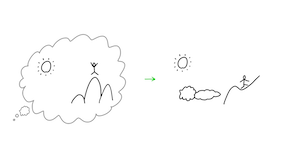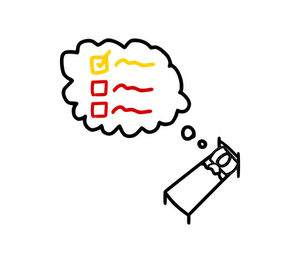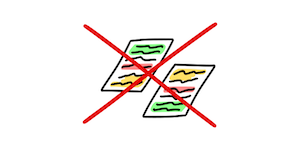The new meaning of hard work
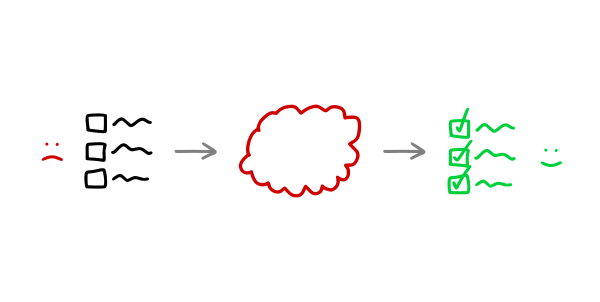
Hard work used to mean plowing a field, chopping wood, or working in a quarry as my grandfather did from sunrise to sunset.
Nowadays, due to our work shifting more to creative endeavors, hard work is taking on a different meaning:
Hard work can be staring at a bunch of post-its for an hour, trying to see the connections.
Hard work can be finally overcoming a fear of video editing or coding and learning something new.
Hard work can be having a difficult conversation with a colleague or a boss.
Hard work can be not giving up on an idea and testing a different variation.
Hard work can be taking a long walk to try to figure out a problem or make a decision.
None of these things are physically hard, but they are emotionally hard.
Why is it emotionally hard? Because it could be stressful and uncomfortable.
The source of that stress is different for different people. Maybe it’s the fear of failure: starting a new business can be risky. Maybe it’s the fear of unknown: we have no idea how to solve this particular problem. Maybe it’s the fear of change: you don’t want to break up with your partner because then you’d be single.
Those are all examples of what makes certain tasks emotionally hard. Yet, this is where real progress happens.
Now, let’s be clear about 2 things:
- Working a lot doesn’t mean you’re doing what needs to be done.
- Long hours shouldn't be a badge of honor. Being busy is often just escaping from the work that actually matters.
We have a short blog post on that if you want a more detailed argument, but otherwise keep reading.
How to start doing hard work
To start doing hard work, it’s helpful to first understand why we avoid it in the first place.
It’s because we feel some kind of resistance towards it. It’s due to stress, frustration, anxiety, fear, or something similar that makes us feel uncomfortable.
But if you look more closely at it, there are several types of hard work:
- Unfamiliar hard work
Work we've never done before or done a long time ago. - Emotional hard work
Anger and fear stop us from acting. - Never-ending hard work
It takes a long time to make progress, both on micro and macro scale.
We'll take a look at each of those now.
Unfamiliar hard work
Many of us are put in a position where we need to do something we've never done before. It might be writing a thesis, creating a client pitch presentation, or integrating a payment gate into a codebase. Whatever it is, we're not familiar with the process.
Unfamiliarity is dangerous.
When we’re confronted with an unfamiliar task, alarm bells go off in our brain. This is doubly true if we're under any sort of time pressure.
Before we dive into the practical part, let's first make something clear.
Familiar vs important
We get into trouble what what we need to do (important) is not familiar to us.
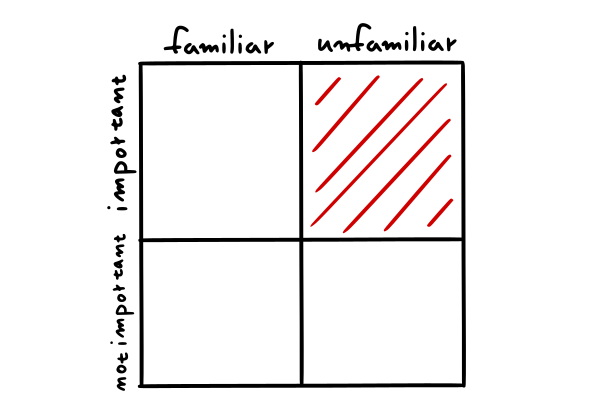
Familiar + important
= let's get it done
This is our area of expertise, we know how to do it, we get into flow. This isn't an issue.
Familiar + unimportant
= busywork
Now, this gets trickier. We prefer work that we're familiar with, and can use it to procrastinate. This is the so-called "productive procrastination.”
Examples: Cleaning your files, updating your profile, doing more research by reading books
While busywork may be more useful than going down a YouTube rabbit hole, it's still work that isn't moving the needle. This is an issue especially if you work for yourself—if you're entrepreneur or freelancer.
Unfamiliar + unimportant
= off-track.
These types of tasks are often on people's "someday lists."
I'd like to learn Spanish, programming, archery,...
It requires a solid investment of research and exploratory effort to move these tasks into the familiar category first.
Unfamiliar + important
= new opportunities, new assignments
This is the biggest issue. You need to do something you haven't done before that could meaningfully impact your life. We put these tasks off, whether it involves writing a thesis, posting your work online, or creating a new product from scratch.
When a task is both unfamiliar and important, we have 2 basic choices:
- Figure it out ourselves
- Delegate it
If we're in a position to hire someone else to do it, that is a legitimate strategy. However, when we are the ones who need to do it, continue reading.
Now, with this model in place, let's take a look at some practical strategies to actually deal with unfamiliar work instead of running away from it.
1A. Go away from screens
Figuring out the unfamiliar task is best done away from screens.
This doesn't come easy to us. We're used to using our phones or computers for everything. The problem is that screens are luring.
Each icon, button, and notification are trying to snare us away from work. They are familiar, in an extremely unhelpful way.
Putting a bit of distance between ourselves and easy distractions is a good tactic to stay on track longer.
Here are 2 battle-tested ways to do that:
- Take a piece of paper, go to another room, and write down anything on your mind for 10 minutes. A piece of paper has no apps. There are no notifications. No messages. This helps us stay focused. Some useful question to ask yourself: What's on my mind? What are the different parts? What's the timeline?
- Go for a walk. Walks are underrated. While it takes a bit of effort to actually get outside, walking brings both physical and mental benefits. When you're walking, your body is occupied, but your mind is free to wander, and it often goes back to the problems at hand. If you point your thoughts in the direction of a task on a walk, you often come up with a new way to tackle it.
Writing and walking both get you away from screens, which is helpful for getting an overview of the problem. But what if you do need to use technology?
1B. Block out distractions
Once you do sit down in front of a computer to work, block out distractions and put your phone away. Again, these are simple tips, but they are no less effective.
When we're confronted with unfamiliar hard work, we start looking for excuses to do anything but the work.
Tidying the room? Sure. Messaging friends? Awesome. Cook a random recipe? Great, let's do that!
Anything, just not the unfamiliar task ahead.
Expect that this urge to run away will show up.
And here's the crucial part, block out easy distractions.
You don't want to make it too easy to act on this urge to run away. By making it harder to access distractions, you make it less likely that you'll get side-tracked.
Here are 3 simple steps to do that:
- Put your phone out of sight, reach, and hearing.
- Block distracting sites in the browser.
- (Alternative) Log out.
Block distractions so that it requires a conscious decision to get off track.
2. Start with recon (exploration)
You shouldn't expect yourself to be efficient right from the start.
It's hard to "get it done" when you have no clue how.
There is a beautiful word, often used in military, for taking action to find out more information: reconnaissance (shortened to recon).
For example, recon can entail going into dangerous territory to see what the terrain looks like and where the enemy is stationed.
In our everyday lives, recon is slightly less exciting. You read a bit here, do a bit there, and a bit there, slowly the fog begins to clear. Think of it as exploring the territory.
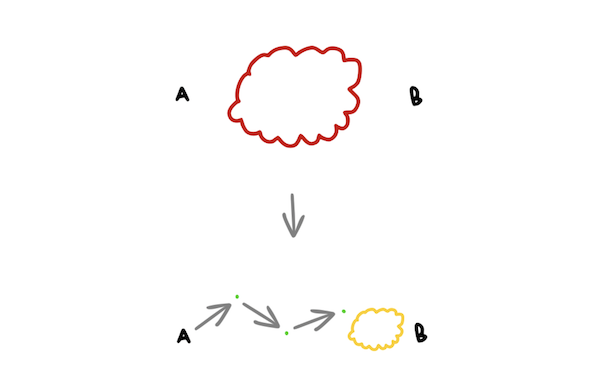
Remember: this kind of "bumbling about" and figuring things out doesn't feel that great. It might be boring at times, you might feel frustrated. That's okay. It's all part of the process.
So don't put pressure on yourself to tick tasks off right from the start and be #productive. Set aside time for exploration.
This exploration can mean different things: sketching, writing outlines, collecting relevant articles, reading,... It can also take 30 minutes or several days, it all depends on your task.
Just make sure that this research doesn't become procrastination in and of itself.
As soon as you can, dive into the task proper.
Emotional hard work
The two main emotions we'll focus on are anger & fear. Both can make work hard.
Get calm beforehand
If you know you're going to be dealing with someone who makes you angry, or if you know that a task makes you feel afraid, start by getting calm.
The how is up to you. What makes you feel calm? Meditation? Walks? A nap? With many of us working from home, these can all be legitimate options.
On a more practical level, 2-5 minutes of deep breathing will get us to a better mental state. One from which we'll be less reactive.
If you know a task will be emotionally taxing, get calm beforehand.
Use somatic awareness to lessen emotions
Somatic awareness is a fancy word for noticing how your body feels. When we get angry or afraid, these emotions often manifest as physical sensations: tightness in your stomach, tensed shoulders, hunched shoulders, shallow breaths,...
When we notice this, and relax those areas deliberately, the pressing sensation of the emotion gradually subsides. Many types of mindfulness meditation use this principle.
Use journaling and reflect
Of course, we can also develop our general ability to understand and deal with our own emotions.
Journalling is a good way to start. You can start with simple questions like: What's on my mind? What happened today?
And then you start writing. This kind of reflection makes you more aware of your internal monolog. When we see the words on paper, it's often easier to become more deliberate, and become more of an observer of your own behavior.
Never-ending hard work
Of these 3 types of hard work, this one is the most obvious—you simply have so much to do.
This can be daunting and overwhelming, and confronting those feelings is what makes it hard.
Never-ending in this context can mean 2 things: long hours every day or working on the same thing day in, day out, for weeks, months, or years.
Both can make us feel like the work is too much to handle, which often leads to procrastination.
Make progress visible
We need to see that we're making progress. This is essential.
If we're making visible progress every day, we'll feel okay. We'll see the end in sight.
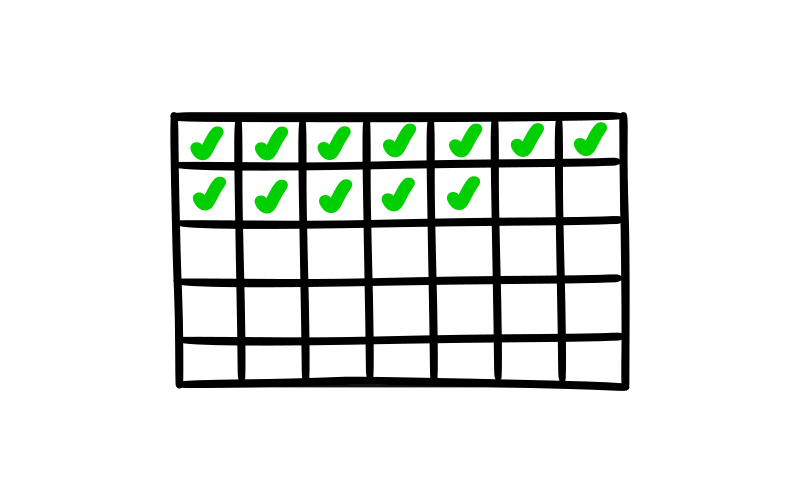
We get into trouble when the progress is invisible, or when we don't see the end in sight. That's when we feel overwhelmed. That's when we're tempted to get discouraged.
Take the example of writing.
You open a file and you write or edit. At the end of the work session, you close the file. But the next day you open it, it looks like not much has changed. It still looks like words on a screen. This isn't good.
When we can't see if we're making progress, we get demotivated. Day in, day out, you open the same file and do the same type of work. This will get tiresome.
What we need is to capture progress in a highly visual way.
This can take various forms: you can count words and put them on a graph, you can put a checkmark on a calendar every day, or you can use differently colored ink on different days.
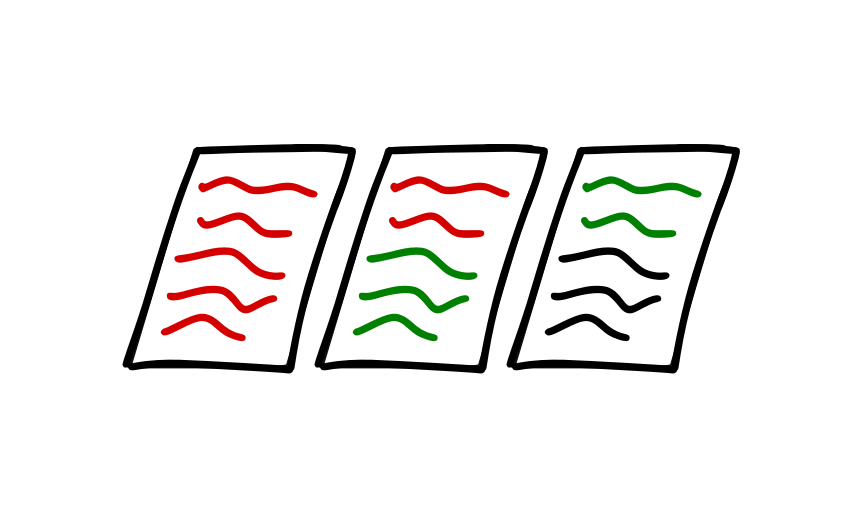
The point is to make clear to yourself how much work you've put in so that you see you're moving forward.
Even if the finish line is far, you'll feel good enough to continue working so long as you're moving forward (and see your progress).
Summary
The ability to do hard work is a lot about staying honest with yourself. Working a lot isn’t the same as working hard. Busywork is one of the most frequent forms of procrastination, serving as a way to hide you from hard tasks that would actually help you make progress in life.
Now, what tasks have you been putting off because they are unfamiliar?
What have you been putting off because it makes you angry or afraid?
What have you been putting off because it feels like the work is never-ending?
That’s the hard work worth doing.

